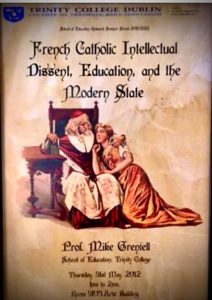Intellectual Response: The Crisis is French Catholicism

I have always been interested in the way ideas shape society and are shaped by it.
Here is my study of the way French intellectuals responded to the ‘crisis’ in French Catholicism. France was always an avowedly Catholic country, partly as a result of its traditional, rural population.
However, from the C18 and C19 centuries, there was creeping, and then accelerating, secularization – what they called ’dechristianisation’. Invariably, this went with urbanization: the move from country to town and the destruction of traditional social structures, and with this beliefs.
This study sets out the situation; tracks the response of the Church to it – in the form of a series of ‘missions’ and Christian groups, and then the so-called ‘non-conformists’ of the 1930s. The latter responded both to the processes of secularization and what to do about it, and also flirted with alternatives to American Capitalism: Communism and Fascism.
Many projected a position of ‘Ni droite, ni gauche’, politically (neither right, nor left’. They were also ‘revolutionary’ – but of the spirit. A common theme was ‘ L’épanouissement de la personne’ – literally, ‘the blossoming of the person’ – or soul. How to bring this about through a range of social movements is also included in the study – like the ‘Peuple et Culture’ group who set about developing a series of adult education (educationpermanente) groups to develop the cultural dimensions of French citizens (reading, photography, tourism, art, music, etc.) These were the precursors of the ‘Maisons de la Culture’ of the early 5th Republic.
There is also an account of the “Prêtres ouvriers’, where ‘worker priests were employed in factories to animate religious aspects of work life; offering Mass during the lunch breaks, etc.
See also chapters 3 and 4 of my book: Bourdieu’s Metanoia (2023 Routledge).
http://www.michaelgrenfell.co.uk/metanoia-and-bourdieu/
Because the document is quite heavily – Mb-wise – it is divided into four parts:
Part 1: pp. 1- 24
Introduction
Brief History – the Church and the State
Dechristianisation – Industrialisation
Social Catholicism
Action Catholique
Part 2: pp. 25 – 49
The Intellectual Spirit of 1930
Conclusions
Footnotes
Bibiography